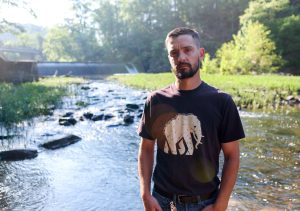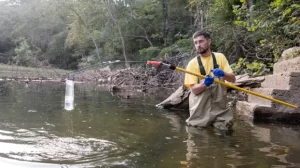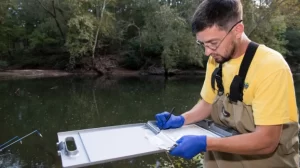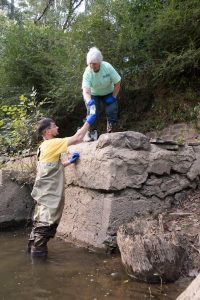The Cahaba River is Alabama’s longest remaining stretch of free-flowing river. It supplies water for more than 1 million people and households in the state. It’s also one of the most biodiverse waterways on earth, providing precious shelter and nourishment for vast species. The Cahaba Riverkeeper, a non-profit organization that works to protect and restore the Cahaba River and its watershed in central Alabama, understands the river’s importance to the people and ecosystems of Alabama.
River enthusiast David Butler got his start as the Cahaba Riverkeeper in 2015 after years of deep dedication as a volunteer and board member. He was promoted to staff attorney in 2018. As the staff Riverkeeper, David’s responsibilities include: overseeing the successful Swim Guide program, organizing river cleanups, responding to pollution complaints, managing our intensive data collection efforts, speaking to concerned citizen and civic groups, as well as a host of other duties. His goal is to ensure the river is safe for the public to revel in its immense beauty and protect it for future generations to enjoy.
Butler’s work at CR involves a wide range of legal and advocacy efforts aimed at preserving the health and vitality of the Cahaba River ecosystem. He works closely with other staff members to identify and address environmental threats to the river, including pollution, overdevelopment, and unsustainable land use practices. In his role as staff attorney, Butler also represents Cahaba Riverkeeper in legal proceedings and works to promote stronger environmental regulations and policies at the local, state, and national levels.
Before joining Cahaba Riverkeeper, David studied finance at the University of Kentucky, before moving on to work in the financial research industry in New York. After six years, David returned to the south and enrolled at the University of Alabama where he earned a Journalism degree. While studying in Tuscaloosa, David started working part-time at the former Alabama Small Boats shop and reignited his passion for rivers. In 2018, David earned his J.D. from the Birmingham School of Law and was admitted to the state bar later that year.
“I’ve been with The [Cahaba] the Riverkeeper for 12 years. And I started as a volunteer,” said Butler. “I had a little business where I rented canoes and took people out on the river. I enjoyed introducing people to the river for the first time and showing them how beautiful it was.”
Butler’s dedication to protecting the Cahaba River makes him an invaluable Cahaba Riverkeeper team member.
Butler says while conducting his tours, guests, with natural curiosity, began asking him questions such as, “Is it safe to swim?” “What’s this fish?” “What’s this bird?”
“In an effort to be a better guide, I thought, I’ll learn everything there is to know about the river,” said Butler.
He began searching for organizations that could teach him even more about the Cahaba River than his enthusiasm had already allowed.
“I found a bunch of different groups that advocate for the river, but I was interested in collecting information, you know, creating a plan, a reasonable approach to preserving the river. And that’s how I found Cahaba Riverkeeper and my boss, Dr. Crawford, who is the Executive Director,” said Butler.
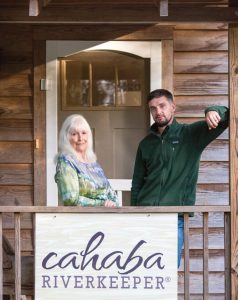
Myra Crawford, Executive Director of Cahaba Riverkeeper and David Butler, Staff Attorney and Riverkeeper.
Butler’s familiarity with the Cahaba River allowed him to collect data on the ongoing health of the river itself and the rich biodiversity within it. He conducted small tasks to aid in keeping the river clean while continuing to educate the public about the importance of the massive watershed.
“I have really tried to stay focused on what our original intent was, which was just to collect as much information as we could about the health of the river,’ said Butler. “It’s unreasonable to believe that a state agency like [Alabama Department of Environmental Management] ADEM can be everywhere all the time. And so I knew that before I ever started this job.”
Despite gaining crucial information about river-keeping throughout his career, Butler says the most surprising thing has been agencies’ need for more support and responsibility. Although these agencies have been held accountable for upholding the Cahaba’s prestige, Butler says sometimes these agencies act with their best interests in mind.
“I thought that we would be teammates, that we would build a network of people that would help watch the river and would notify us of problems. And then, we would communicate that to the appropriate agency with evidence and data to show what was going on. And then, they would take action to get it resolved,” said Butler.
The main issue plaguing the Cahaba River is pollution. Agricultural runoff is one of the most significant sources of pollution in the Cahaba River. Farms located upstream of the river can release excess fertilizers, pesticides, and other chemicals into the water, leading to algal blooms, fish kills, and other harmful impacts on the river ecosystem. In addition to agricultural runoff, industrial activities, and urban development can also contribute to pollution in the Cahaba, releasing chemicals, waste, and sediment into the river.
Another primary source of pollution in the Cahaba is sewage and wastewater. While many communities have installed wastewater treatment plants to remove harmful pollutants from their sewage, these systems can sometimes fail or become overwhelmed during heavy rain events. When this happens, untreated sewage can be released directly into the river, posing severe risks to public health and the environment.
“It’s not because what we’re asking is unreasonable. It’s because there are some really powerful lobbyists in the state who don’t want to be regulated, who want to make their own decisions and influence state policy to benefit them personally,” said Butler.
With most Alabamians depending on The Cahaba River for daily water use, the river must maintain safe sanitation and constant regulation. For sanitation to happen, agencies like Birmingham Waterworks act as a treatment center and middleman for citizens living within Jefferson County to access clean water. Entities can easily stay caught up on responsibilities like upkeeping pipelines, fixing pipe leaks, and regulating nearby industries. A pipe leak on the Cahaba River can have severe consequences for the health of the river ecosystem and the communities that depend on it. A pipe leak can release various pollutants into the water, including oil, chemicals, and other hazardous substances that can harm aquatic life, contaminate drinking water, and disrupt recreational activities.
“We have this amazing biodiversity and Alabama, and unlike many things, when something goes extinct, you know, its near impossible to restore that species,” said Butler. “We’re running out of time to preserve some of what makes Alabama so biologically rich. And I think the biggest fear for us is that our children and their children won’t have the opportunities to experience the beauty of Alabama in the same way we have.
If a pipe leak occurs on the Cahaba River, organizations like CR work to respond quickly to the incident and minimize the leak’s impact. This may involve monitoring water quality, conducting assessments of the extent of the leak, and working with local and state agencies to coordinate a response. Butler says this can be difficult in places like Birmingham because of the history of corruption in state-regulated agencies.
“When you look at the management of Jefferson County and the Birmingham waterworks board, it’s been kind of plagued by corruption and, you know, all sorts of problems. And as a result, we all pay more for water and sewer than we would if they had been responsibly managed,” says Butler.
In some cases, the source of the leak may be identified, and steps are taken to repair or replace the damaged pipe. In other cases, the cause of the leak may be more difficult to determine, and cleanup efforts may be more challenging.
“What’ll happen is we’ll have a leak, and they’ll come out and kind of patch it and not really repair the problem. And then a short time down the road right next to the patch, the pipe breaks again, and so you have the same water, really,” said Butler. “Over the last couple of years, we’ve gotten crazy complaints about people getting water bills for $10,000. And, you know, it’s just a very, very old system that has not been maintained because the priority has been adding new customers at the expense of old customers.”
Butler believes that this stems from developers on the city level continuing to put profit from progression over people despite it needing to be a more safe practice for everyone involved.
“What we don’t hear is an accounting of what the environmental cost is and how that impacts the cost of a project. I think it’s a really important piece of these decisions that’s often left out, you know, what is the actual harm to the environment. And I think it’s just something that systemically we’ve always done a very poor job of, is evaluating the true worth of our natural resources,” said Butler.
He uses his role as Staff Attorney and previous role as Riverkeeper to be a spokesperson for The Cahaba River and the people who depend on it to provide for their daily lives.
“We’re really evaluating not just the short-term economic benefit, but the long-term, environmental cost,” said Butler.
Not considering how much a new development may cost monetarily and environmentally, the sustainability of The Cahaba and its resources are put at risk.
“Those kinds of actions or failures are driven by really wealthy developers and businessmen and women who advocate for their own self-interest, and who ultimately gets hurt the most is the poorest people in our community, said Butler. “We have clearly demonstrated who the responsible party is, and then had to really fight to force ADEM to take steps to fix it. And in some instances, we aren’t able to, so that’s kind of how we ended up in litigation is that, you know, the state just absolutely refuses to do what they should do.”
Butler says that despite experiencing decades of blameshifting, corruption, and sanitation hazards, there is still a way to protect the river and see progressive development in Alabama. He reminisced on the 2016 gasline spill from a Colonial Pipeline. The leak eventually resulted in an explosion but ultimately did not affect water or air quality because of the industry’s swift and receptive response by working with CR’s conservation efforts.
“It’s the living example of what we always tell people, ‘We’re human, right?’ We make mistakes all the time, and you hear it all the time, right? It’s what you do after the mistake. It really defines who you are,” said Butler. “They took responsibility, wanted us to hold them accountable, welcomed us into the decision-making process about how they would approach it. And I think it’s a true demonstration of how collaborative solutions can work.”
Butler says that collaboration is in everyone’s best interest of mind. CR is constantly encouraging working with industries, developers, and agencies before having to escalate misregulations and prosecute cases. Butler also urges citizens to collaborate with organizations like CR to avoid being taken advantage of, report any issues that arise, like pipe leaks and hazardous dumping, and monitor increasing water bills. By having people support CR’s efforts through volunteering, reporting, attending city hall meetings, and donating, CR can acquire materials needed for testing and litigation costs and conduct further cleanups in The Cahaba. Butler hopes that as much as Alabamians depend on The Cahaba River, The river can also rely on its people to maintain its beauty, life, and resourcefulness. He says he is most optimistic about the efforts he sees as more youth take responsibility for their environment and its future sustainability.
“The biggest improvements we’ve seen is some of the older generation retiring. And younger people taking on roles with more authority and more input into long-term planning and decision-making. And so, I’m optimistic that there is the ability to change.”
To learn more about David Butler and the efforts of Cahaba Riverkeeper to keep Alabama’s water clean, visit cahabariverkeeper.org and join their supportive network today.


